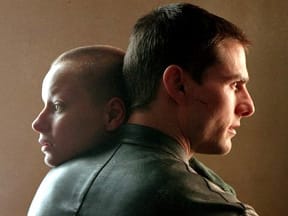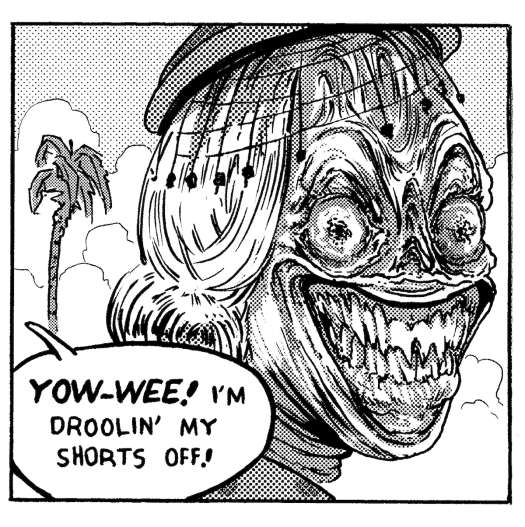Given that Tom Cruise hasn't played the action icon since "Mission Impossible 2" and the fact that Spielberg hasn't made an overwrought sci-fi epic since, well, his last movie, anticipation for "Minority Report" was justifiably high. Unquestionably, Cruise is a good, sometimes great actor, but is impeccably suited for action roles, despite his diminutive stature (he really is kind of short). While the elder Spielberg is a master at effects and sometimes storytelling whether it be a mechanical shark ("we're going to need a bigger boat") or CGI, well, anything, the man has adapted to, and even driven, the technology of the times. Which makes the fact that "Minority Report" is just a good movie, barely, that's utterly derivative of other fare and not a great movie all the more disappointing.
"Minority Report" is well below either of the two's abilities at this point (although "Vanilla Sky" did kind of suck), and if you've seen "Logan's Run," "The Fugitive," "Timecop" and Cruise's "Mission Impossible," you've seen this movie. Based on a short story by Philip K. Dick, although undoubtedly an utterly co-opted one by this point, "Minority Report" sets itself a half-century into the future, where murder in Washington, DC, has all but been eliminated by a branch of law enforcement known as "precrime." Their secret? Telepaths - three actually, known as "precogs" - with the ability to predict murders before they happen, and Cruise, of course, who leads an elite team that stops the murders before they can actually happen. Forget about the morality of arresting people for crimes they didn't commit, and the temporal paradoxes of changing timelines, as they are quite glossed over in this movie.
Tormented by the loss of his son, his subsequent failed marriage and resulting drug abuse - after all, people like flawed good guys these days - Cruise throws himself into his work, and when he himself is shown killing a man he's never met, which incidentally coincides with the arrival of a federal investigator (played smartly by Colin Farrell), he becomes a fugitive, determined to prove his innocence to a system that's never wrong. What follows is an unfortunately predictable action/thriller chase, with only two really thrilling segments, where, bit by bit, Cruise uncovers the conspiracy around him.
However, it does look impressive, if overly grey. Senor Spielbergo's vision of this future, for which he apparently hired a team of "futurists" to help facilitate, is one of moderation. Not as bleak or oppressive as Ridley Scott's "Blade Runner," but still illustrating the contrast between technological advancement and urban sprawl, it is a somewhat Orwellian, consumer-driven future where commercials and advertisements aggressively interact with people, newspapers update themselves to the moment, magnetic cars "drive" people, retinal scans identify everyone and computer interaction has turned virtual. A few plot twists, turns and red herrings are thrown out to liven up the spectacle, and it is all about the spectacle, but viewers are so ingrained to expect the good guy to be good and thriller/action films to follow certain paths that they are little more than distractions, and the bleak ending hinted at, which would have made this a much better movie, is discarded in a favour of a typically cliché resolution. Still, it looks great, Cruise is his usually strong self and as an action/thriller, it'll undoubtedly do huge bank, but despite its predictable plot, if the thought of Gap ads speaking to you isn't one of the scariest warnings of our unwritten future, than nothing is.
"Minority Report" is well below either of the two's abilities at this point (although "Vanilla Sky" did kind of suck), and if you've seen "Logan's Run," "The Fugitive," "Timecop" and Cruise's "Mission Impossible," you've seen this movie. Based on a short story by Philip K. Dick, although undoubtedly an utterly co-opted one by this point, "Minority Report" sets itself a half-century into the future, where murder in Washington, DC, has all but been eliminated by a branch of law enforcement known as "precrime." Their secret? Telepaths - three actually, known as "precogs" - with the ability to predict murders before they happen, and Cruise, of course, who leads an elite team that stops the murders before they can actually happen. Forget about the morality of arresting people for crimes they didn't commit, and the temporal paradoxes of changing timelines, as they are quite glossed over in this movie.
Tormented by the loss of his son, his subsequent failed marriage and resulting drug abuse - after all, people like flawed good guys these days - Cruise throws himself into his work, and when he himself is shown killing a man he's never met, which incidentally coincides with the arrival of a federal investigator (played smartly by Colin Farrell), he becomes a fugitive, determined to prove his innocence to a system that's never wrong. What follows is an unfortunately predictable action/thriller chase, with only two really thrilling segments, where, bit by bit, Cruise uncovers the conspiracy around him.
However, it does look impressive, if overly grey. Senor Spielbergo's vision of this future, for which he apparently hired a team of "futurists" to help facilitate, is one of moderation. Not as bleak or oppressive as Ridley Scott's "Blade Runner," but still illustrating the contrast between technological advancement and urban sprawl, it is a somewhat Orwellian, consumer-driven future where commercials and advertisements aggressively interact with people, newspapers update themselves to the moment, magnetic cars "drive" people, retinal scans identify everyone and computer interaction has turned virtual. A few plot twists, turns and red herrings are thrown out to liven up the spectacle, and it is all about the spectacle, but viewers are so ingrained to expect the good guy to be good and thriller/action films to follow certain paths that they are little more than distractions, and the bleak ending hinted at, which would have made this a much better movie, is discarded in a favour of a typically cliché resolution. Still, it looks great, Cruise is his usually strong self and as an action/thriller, it'll undoubtedly do huge bank, but despite its predictable plot, if the thought of Gap ads speaking to you isn't one of the scariest warnings of our unwritten future, than nothing is.




